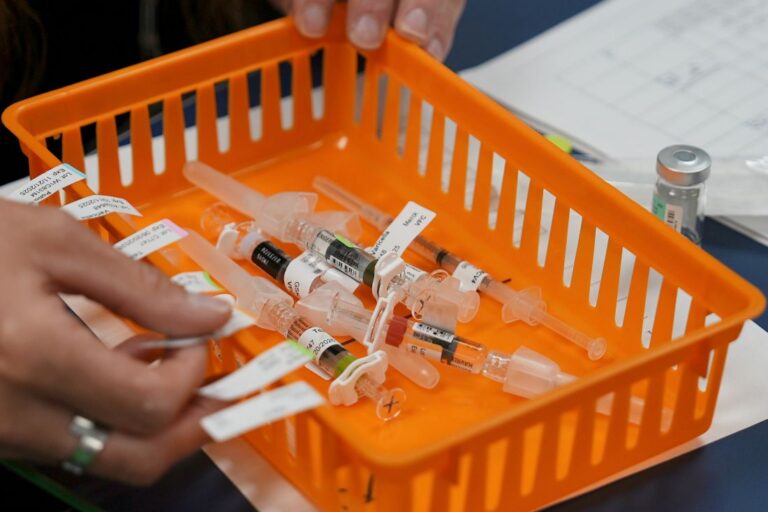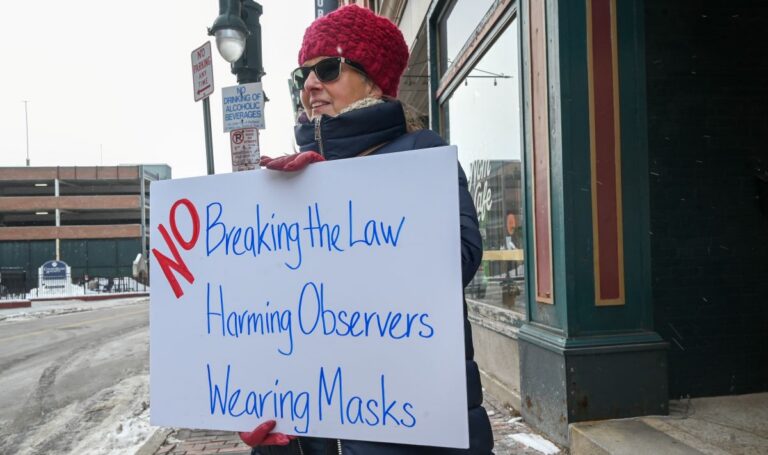Some days, Jake looks up at his mother and says he’s broken. Other days, he borrows language from the insults hurled at him by middle-school peers, and says he wishes he were “a real boy.”
Jake has identified as transgender for as long as he can remember; at two years old, he pointed to his mother’s pregnant stomach and declared that he was soon to be a big brother.
Still, no amount of time could prepare thirteen-year-old Jake or his mother, Allison (both mother and son have requested pseudonyms to protect their identities), for the recent slew of political threats to transgender children.
“I used to think, if I provided him with a really supportive environment, if I didn’t allow people that do not support him into our lives, if I took him to the Gender Clinic — if I did everything you’re supposed to do to take care of a trans child — then he would be good,” said Allison. “But that’s just not the case.”
Tensions between Maine lawmakers and the Trump administration have escalated in recent weeks over Maine’s policy allowing transgender girls to play sports in line with their gender identities.
Following a viral social media post by Maine House Republican Laurel Libby (R-Auburn) — a critique of the state’s policy accompanied by a photograph of a transgender high school athlete — President Donald Trump threatened to pull federal funding from Maine schools.
“See you in court,” responded Maine Gov. Janet Mills, when President Trump addressed her at a meeting of governors in Washington, D.C.
The Trump administration and lawmakers across the country have been taking aim at transgender people in recent weeks. One of the first executive orders signed by President Trump called on the federal government to define sex as only male or female; another, since temporarily blocked by a federal judge, seeks to stop transgender people under nineteen from accessing gender-affirming care.
In Iowa, lawmakers recently passed, and Gov. Kim Reynolds signed, a bill removing gender identity from state civil rights protections. In addition to the federal executive orders, more than 690 bills across 49 states currently target transgender individuals, including bills recently introduced in Maine.
While the landscape has injected fear into the lives of transgender children and their families, organizations that support LGBTQ+ youth said Maine’s legal protections remain strong.
Executive orders do not function as laws; they are subject to over-rule by Congress and the Supreme Court, said Mary Bonauto, Senior Director of Civil Rights and Legal Strategies at GLAD Law. Withdrawing funding allocated by Congress “is not something that is simply at the will of the president,” said Bonauto.
“If the federal government is going to place a condition on funding, there are processes that they must go through that are real and take time. Funding conditions cannot deny constitutional rights.”
Congress is invested with the “power of the purse,” the ability to tax and spend public money. As the Trump administration tests the boundaries, however, it remains uncertain to what extent the Supreme Court will issue a check on the use of executive power.
Questions over control of funding appropriated by Congress are already making their way through the courts. Earlier this week, a federal judge blocked an attempt by the Trump administration to withhold funding from hospitals providing gender affirming treatment; on Wednesday, a divided Supreme Court rejected the Trump administration’s bid to freeze nearly $2 billion in foreign aid.
In a conversation with the Portland Press Herald, Dmitry Bam, a constitutional law professor at the University of Maine Law School, said there is “rightful skepticism” regarding the likelihood that the Supreme Court will limit presidential authority. (The University of Maine is currently under federal investigation for Title IX compliance, following Trump’s threat to pull funding from Maine schools that don’t comply with the executive order. Representatives from the law school declined to speak for this story).
Several advocates in Maine, however, said they had “relative confidence” Maine would continue protecting the rights of transgender Mainers.
“I would be very surprised to see any anti-trans legislation come out of this [the Maine] legislature,” said Bre Danvers-Kidman, executive director of MaineTransNet and the first openly nonbinary person to run for U.S. Senate, in early February.
When The Maine Monitor checked in with Danvers-Kidman this week they expressed somewhat more trepidation.
“We are starting to see the federal government test the waters with financial pressure… it’s a lot of federal money [on the line] and it’s scary. But we’ve seen no indication that Maine intends to back down on protecting our human rights,” said Danvers-Kidman, adding that they’re heartened by statements from Governor Mills, Attorney General Frey, and the Maine Principals Association in support of transgender Mainers.
Both Danvers-Kidman and Gia Drew, executive director of MaineTransNet, cited the Maine Human Rights Act, which prohibits discrimination based on protected class, including gender identity and gender expression, in employment, housing, places of public accommodation, education, and extension of credit, as an additional bulwark against the federal pullback on transgender rights.
Confrontation over trans athletes escalates
The confrontation between the state and the Trump Administration has intensified in recent weeks, with the U.S. Department of Health and Human Services finding that Maine is in violation of Title IX for allowing transgender student-athletes to compete in women’s sports, according to reporting by the Bangor Daily News.
The letter announcing the finding came on Feb. 25, just four days after the U.S. DHHS opened its investigation; no state officials were interviewed before the U.S. DHHS reached its findings. The Department is also investigating the Maine Department of Education and the University of Maine System.
In addition to the U.S. DHHS investigations, Maine has been the target of several probes since the spat in D.C., including by the U.S. Department of Education, which said it was investigating the Maine Department of Education and SAD 51, the Greely school district, for allegedly violating Title IX, and by the U.S. Department of Agriculture, which said it was investigating the University of Maine.
There are also several bills related to trans athletes in girls’ sports making their way through the Maine legislature. L.D. 233, sponsored by Rep. Richard Campbell (R-Orrington), would bar transgender athletes from playing on girls’ sports teams. A similar bill, L.D. 868, sponsored by Rep. Liz Caruso (R-Caratunk), would bar transgender girls from girls’ sports teams, bathrooms, and changing rooms. It drew a crowd of both supporters and opponents to the statehouse in late February.
Maine House Joint Resolution 500 seeks to pull funding from any educational institution that pays dues, or is a member of, an organization that allows trans girls to play sports in alignment with their gender identities.
Gov. Mills has refused to take a position on the state’s policies governing transgender students’ participation in athletics, saying recently that the topic was “worthy of a debate” in the State House.
While polling by the Washington Post in 2023 showed that a majority of Americans support laws prohibiting discrimination against trans people, fewer appear to support the participation of trans athletes in girls’ sports. A January 2025 New York Times/Ipsos poll found that only 18 percent of Americans believe transgender female athletes — those who were assigned male at birth — should be allowed to compete in women’s sports.
“How are people falling for the idea that the biggest problem in our state is a handful of children who want to play sports?” asked Danvers-Kidman, in response to the recent events. When it comes to physical advantages in sport, they added, there are as many variances between cis-gender kids of the same gender as there are between kids of different genders. “It’s not about sports, it’s about who is expendable in our society.”
The Maine Principals’ Association has reaffirmed in recent weeks its support for transgender athletes competing in sports that align with their gender identity, a policy it says aligns with the Maine Human Rights Act.
Gender-affirming care, providers also a target
Lawmakers in Maine are also taking aim at healthcare for transgender people, particularly children. L.D. 380, sponsored by Sen. David Haggan (R-Penobscot), would change laws that protect patients who seek gender-affirming care, and the medical professionals who provide it, modifying the law with regards to address confidentiality, medical malpractice insurance, and other provider protections. The bill has yet to be scheduled for a hearing.
Maine law protects the right to gender-affirming care and ensures coverage under private health plans and MaineCare. Maine is also one of 14 states (plus D.C.) that protect minors’ rights to best practice, gender-affirming medical care.
In June 2023, Gov. Mills signed into law L.D. 535, which allows transgender minors to receive gender-affirming puberty-blockers and hormone treatment — but not surgery — without the consent of their parents, if they meet the following criteria: they are at least sixteen years old, they have received a diagnosis of gender dysphoria (a term used to describe psychological distress resulting from incongruence between a person’s gender identity and the sex assigned to them at birth), they are experiencing harm or will experience harm without this care, and they are mentally and physically able to provide consent.
In 2024, Gov. Mills signed a shield law, which protects Maine’s providers of reproductive and gender-affirming care from retaliation by states with more restrictive policies. Maine became one of only fourteen states with a shield law protecting gender-affirming care. Similar laws protecting those providing abortion care across state lines are currently being tested in court.
Efforts to block care for minors go against medical research and the endorsements of every major health organization, including the American Academy of Pediatrics and the American Medical Association, said advocates.
“When all the major medical associations say that gender-affirming care is appropriate when you have a certain diagnosis, politicians should not be getting involved in the decision-making process between a young person, their doctor, and their family,” said Drew of EqualityMaine.

The debate on gender-affirming care for minors — including what constitutes “best practice” — has engendered strong emotions across the political spectrum. But only a very small percentage of minors actually receive gender-affirming surgery and medications.
A recent study published in JAMA Pediatrics analyzed private insurance claims from 2018 to 2022 to find that less than 0.1 percent of transgender and gender diverse minors received puberty blockers or gender-affirming hormone treatment.
Over email, lead author Landon Hughes told The Maine Monitor that he is not aware of any state-level data that reflects the number of adolescents in Maine using gender-affirming medications. Danvers-Kidman, of MaineTransNet, said the percentage of Maine minors on hormone treatment is likely much smaller than 0.1 percent, as this figure includes both hormones and puberty blockers.
“Minors in particular, but all patients getting transition-related care, are [starting with] the least invasive, least-permanent treatments,” said Danvers-Kidman. “Puberty blockers just give you more time to make a decision about whether you want to go through the puberty that your body would naturally do, or whether a different choice would cause less harm to you.”
As for gender-affirming surgery, a 2024 study analyzed insurance claims from 2019 to find similarly low rates among minors. The vast majority (96.4 percent) of gender-affirming surgeries among adolescents involved the chest, and 97 percent of adolescent breast reductions were performed on cisgender boys.
To Allison, the political debate on gender-affirming care complicates an already taxing process for transgender youth and their families.
Throughout his childhood, Jake would visit the MaineHealth Gender Clinic to test for signs of puberty, via bone density scans. A few years ago, he started puberty blockers. Jake cannot start hormone treatment until he turns fourteen, in accordance with current medical standards.
“But most of his peers have already gone through puberty. He’s going to be in high school next year. He really wants to start T[estosterone],” said Allison, who also said she has discussed many difficult topics with her son, including the fact that he will not have biological children if he continues with treatment. Jake already knows this, said Allison, and he does not wish to go through female puberty or to be pregnant.
“The potential for him to lose access to health care is terrifying,” said Allison. “There’s just a few more years before he turns eighteen. Hopefully, they’ll leave him alone after that.”
Representatives of LGBTQ+ focused organizations are quick to point out that the impacts of anti-transgender executive orders extend far beyond the potential legal ramifications.
According to a National Survey by the Trevor Project, roughly half of all transgender and nonbinary youth in the U.S. seriously considered attempting suicide in 2023. The survey found worsened mental health outcomes following anti-LGBTQ+ legislation, and improved outcomes among youth who found their schools and home environment to be gender-affirming.
In a 2022 JAMA Network study, transgender youth with access to gender-affirming care were far less at risk of committing suicide.
Despite the current environment, said Allison, Jake is a joyful and charismatic kid.
“He loves musical theater. He loves video games. He likes to play basketball,” said Allison, smiling. “He’s just a kid.” She credited the protections in Maine, her son’s access to gender-affirming care and the supportive environment in which he lives for his positive attitude.
Medical providers, including Planned Parenthood, MaineHealth and Northern Light Health, Maine’s two largest hospital systems, said they will continue to provide gender-affirming care.
“MaineHealth has made no change to its service offerings following the President’s executive order regarding transgender health care as it continues to evaluate the scope and meaning of all the executive actions undertaken by the new administration,” wrote MaineHealth spokesperson John Porter via email.
Maine Attorney General Aaron Frey also affirmed the state’s commitment in recent weeks, joining a coalition of fifteen state attorneys general to release a joint statement.
“We stand firmly in support of health care policies that respect the dignity and rights of all people,” wrote the attorneys general. “Health care decisions should be made by patients, families, and doctors, not by a politician trying to use his power to restrict your freedoms. Gender-affirming care is essential, life-saving medical treatment that supports individuals in living as their authentic selves.”







